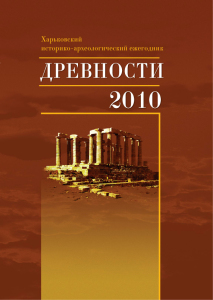До інтерпретації етруського соціального терміну etera
Анотація
Резюме
Янко А. Л. К интерпретации этрусского социального термина etera
В статье анализируются этрусские надписи, содержащие социальный термин etera. Автор дает не только новую интерпретацию этого термина, используя эпиграфические и нарративные источники, но и определяет социальную роль данной общественной прослойки. Он приходит к выводу, что данное слово происходит от греческого слова ἕτερος в значении «иной», а не ὁ ἑταῖρος «спутник, товарищ», как полагали ранее. На основании сообщений античных историков устанавливается, что в Этрурии в IV—III вв. до н. э. существовал институт усыновленных этрусской знатью лиц мужского пола, контролируемый магистратурами, замещаемыми аристократами. Социальная категория etera представляла собой прослойку этрусского общества, состоявшую из оторванных от своих обедневших родов мужчин, приемных сыновей знатных этрусков, ограниченных в политических правах, но включенных в патриархальную семью свого приемного отца и наделенных составными именами полноправных граждан этрусских городов-государств.
Ключевые слова: Этруски, Этрусские надписи, Этрурия, Древний Рим, социальные термины.
Summary
A. Yanko. To Interpretation of the Eetrurian Ssocial Term ‘Etera’
The article is to analyse Etrurian inscriptions, containing the social term etera. Author does not merely give a new interpretation of the term, using epigraphic and narrative sources, but also defines the social role of this stratum of society. He comes to conclusion that the Etruscan noun is derived from the Greek word ἕτερος with meaning ‘other’, but not ὁ ἑταῖρος ‘comrade’, ‘companion’, as it was supposed before. On the base of information coming from the historical sources is established that since the fourth to the third century BC in Etruria existed the institution of adopted by Etruscan elite male persons, which was under control of magistracies, held by aristocrats. The social category etera was used to define a range in the Etrurian society, consisted of men, deprived of their impoverished families, adopted sons of noble Etruscans, limited in their political rights, but included into patriarchal family of their adoptive father and endowed with composed names of legitimate citizens of the Etruscan city-states.
Key words: Etruscan, Etruscan inscriptions, Etruria, Ancient Rome, social terms.




